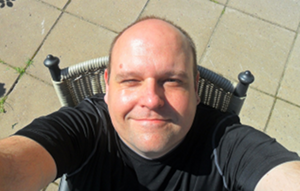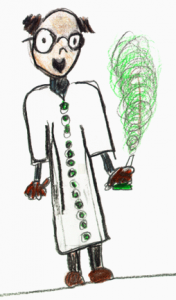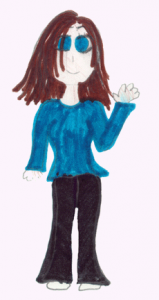News
- February 25, 2015:
- UPDATE: Evolve & Conquer: Teaching evolution via an engaging video game
- Computing a football season
- Arend’s Job Description – The Big Question
- Intelligence With Representations
December 20, 2013:
June 27, 2013:
May 16, 2013:
Search
at Michigan State University
Discussion: What is the responsibility of a science blog?
Earlier in July, we had the BEACON Postdoc and Students retreat covering various topics, including a session about “communicating science to the public.” From that presentation, I get the idea that scientists here in the U.S. have a rather strange public image. In the discussion session, we saw a picture and accompanying description a kindergartner made describing a scientist before an actual scientist visited her school, and she described a scientist as a very strange person, dedicated to their job, who speaks fast, can be annoying sometimes, and, for a lack of a better word, is nerdy as possible. After the scientist visited the classroom, they had her draw another picture of what she thinks a scientist is, and she remarked that scientists have a normal life, and are normal people, and just work at a very different and nerdy job. The rest of the session, which Danielle did a great job of putting together, was about how we can talk to the public in such a way that they can understand us, and how we can come across less nerdy and more human. After all, we have a responsibility to the public, because they pay us.
Before:
I think of a scientist as very dedicated to his work. He is kind of crazy, talking always quickly. He constantly is getting new ideas. He is always asking questions and can be annoying. He listens to others’ ideas and questions them.
– Amy
After:
I know scientists are just normal people with a not so normal job. . . . Scientists lead a normal life outside of being a scientist. They are interested in dancing, pottery, jogging and even racquetball. Being a scientist is just another job which can be much more exciting.
– Amy
I agree that it is quite easy to come across as self-involved, arrogant, and condescending when talking about science, particularly because when I talk about my own work, I actually know what I am talking about. I performed the experiments; I dedicated months of work to testing hypotheses; I read the literature; and now I am convinced the statements I make are true. And quite frankly, the public I talk to does not speak my language, aren’t trained scientists, and sometimes doesn’t understand that “I don’t think so,” “I don’t believe in causality,” or even better “this is just a theory” aren’t valid counterarguments. Again, I agree: we have to come across less arrogant, and less bossy, regardless of the fact that we sometimes speak the truth. Statements such as, “Washing hands reduces the risk of food-born disease” or “Earth isn’t the center of the universe” were considered preposterous when they were first proposed, but now they are considered common sense.
We also have a another kind of responsibility. The average user visits the BEACON website for roughly 2 minutes. And I bet that the average time the public spends on reading anything of importance or at least on anything containing scientific information drops over the course of time. The public will spend less and less time on science, and our reaction shouldn’t be to become more and more publicly-compatible. If we arrive at the level of our public media, who already reduce content to quotes like: “Army strong,” “Yes we can!,” and “Wall street vs. main street,” then in ten years we will end up summarizing our work to this: “Evolution in action!,” “Cooperation works,” or “Robots are now thinking for themselves!” Of course I am exaggerating, and the punch lines I gave are only to get the point across.
If this trend continues, the attention span of the public will become shorter and shorter, and by making science more compatible with the masses, we support that trend. We as scientists will not have it easier in the future because the public thinks we are just a bunch of nice people with normal lives. We will have it easier in a society that has the intellectual capacity to understand that science has to be done, and appreciates that we dedicate our lives to become very nerdy and live extraordinary lives. When I visit a school, I want the children to write:
Scientists are very curious and they can not stop thinking about all the wonders of the world around us. Sometimes they try really hard to explain what they do, and I didn’t understand everything right away, but everything they do can be learned. I think scientists are like dancers who have to dance, or painters who have to draw, but instead of dancing or drawing, they have to think and make experiments. And like painters who make our world more beautiful or like composers who write songs that make me happy, scientists share their discoveries so we know how to build better cars, develop medicine that cures sick people, fly to the moon, and let us understand where we came from. Not everyone can become a scientist. You have to be very curious and you have to dedicate your life to always learning new things and never stop asking questions.
As a summary, I don’t think it is enough that someone who reads our public articles thinks “wow,” “cool,” or “money well spent,” or has something to talk about with their friends at the next party. Who ever reads our articles has to stop for a moment, think about it, understand more, and then can go on talking about it.

Written by Arend Hintze
(edited by Randy Olson)
Posted in BEACON, Discussion


Brilliant article and you hit the nail on the head. Science communication has gotten very good at telling a cool story, or communicating wonder. What we haven’t done is communicate how to think about science, or why it’s important, or what evidence means. Great article.
I wholeheartedly agree, and I think that this kind of societal change needs to start with very young people. I think adults are much less likely to suddenly develop a deep respect for science especially if they have chosen to pursue an entirely science unrelated career already. People need to be exposed to science and their curiosity needs to be stimulated at a young age in order to have a more lasting impact.
When targeting young children, science communication may very well be more effective with cool and relatable stories. Cool stories don’t need to be dull and shallow and targeted towards low attention spans; they can also invoke deeper thought and inspire people to dig deeper on their own time. I think we should appeal to that inner curiosity in every child and look towards changing the next generation rather than changing adults.